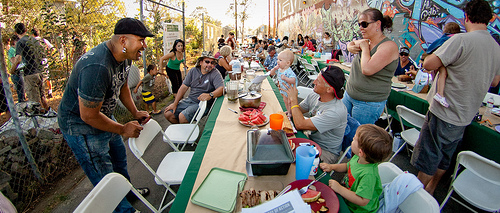
This Slow Food Eat-In in Highland Park, Los Angeles, was part of the 2009 Time For Lunch Campaign, SFUSA's first major attempt to combine food and advocacy on a national level. Photo: Lee Zamastil
When Slow Food came to the United States in 2000, it appealed mainly to people who could already tell their arugula from their radicchio — those who knew both farmers and chefs before the phrase “local food” implied anything more than the sum of its parts.
In the late ’90s, when chef and Slow Food New Orleans chapter founder Poppy Tooker first got wind of the Italy-based organization, which had formed in opposition to the globalizing fast food industry in the ’80s, she felt right at home. “When I read about this movement, I thought, this was what my life’s work had always been about: preserving foodways, valuing the food producers, closing the ties between chefs and farmers. And now there was an international organization out there ready to help me!”
Cut to 12 years later. Slow Food USA has 225 chapters in cities and rural communities across the nation. The term “slow food” has come to be synonymous, in some cases, with a much broader philosophy of eating, farming, and thinking about food. And the national organization has become a kind of conceptual hub for many divergent aspects of today’s food movement.
That’s why the movement took notice recently when Chow.com ran an article titled “Cheap Drama at Slow Food.” Author John Birdsall described a crisis at Slow Food USA (SFUSA): “Its most prominent members — famous cookbook authors, chefs, and leaders in the food movement — are embroiled in a bitter squabble stoked by angry emails, hurt feelings, accusations.”
As a follow-up to Birdsall’s piece, a vocal group of SFUSA critics, including Tooker, have published a document called “10 Things Slow Food USA Can Do To Gain Direction as it Sees its Way Into 2012.” The group believes the Brooklyn-based national office is too reliant on technology, not as connected with its constituencies in other parts of the country, and no longer aligned with the core vision, mission, message, and activities of Slow Food International. They say they worry that the organization is moving away from biodiversity work and direct support of farmers and artisan food producers by adopting a more populist big-tent approach and advocating national policies. And they point to a recent round of layoffs at the Brooklyn headquarters as proof that the organization is in trouble.
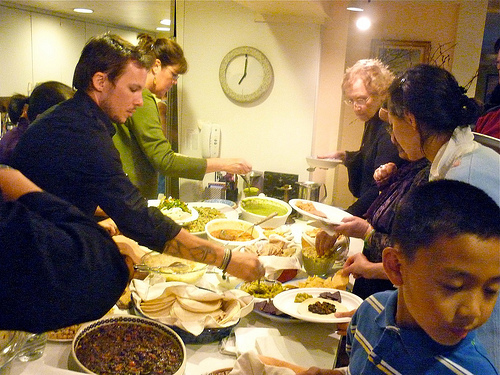
As part of the $5 Challenge, Slow Food members threw potlucks around the country with the goal of spending less than $5/person on ingredients. This one is in Huntington, W.Va. Photo: Slow Food USA
Meanwhile, SFUSA’s Executive Director Josh Viertel and his current staff say they are merely keeping up with the times — and the changing food landscape. No matter how you slice it, the conflict speaks volumes about the challenges that face every effort to build what Slow Food calls a “good, clean, and fair” food system.
Change of course or evolution?
Viertel sees SFUSA as work in progress. In many ways, when he talks about it, he sounds like he’s running a start-up — a stance that inspires and invigorates a portion of his audience, and no doubt alienates others. He doesn’t deny the organization has been financially stressed this year. While SFUSA’s membership has grown from 14,000 to 25,000 members during his tenure, he says “the gift amount has gone down. Those who were giving us $60 gave $45, those who were giving us $45 gave $25, and so on.” Since SFUSA receives half its revenue from members, he chalks up the drop to the pain of a now-three-year-old recession. This year, he says, “it was important to get out in front of it and get the organization in a stable place.”
At the same time, SFUSA has begun reaching thousands more people via email and social media; its mailing list expanded from 24,000 to 250,000 in the last three years, and its very prolific Twitter feed now reaches 200,000 followers.
Viertel has also worked toward creating an organization that can function as an umbrella for the food movement in America — one that can “pick up on all the energy, anger, frustration, etc. that people feel after reading [Michael Pollan’s The Omnivore’s Dilemma],” the book he sees as the Silent Spring of the food movement, “and turn that into actual power to make change.”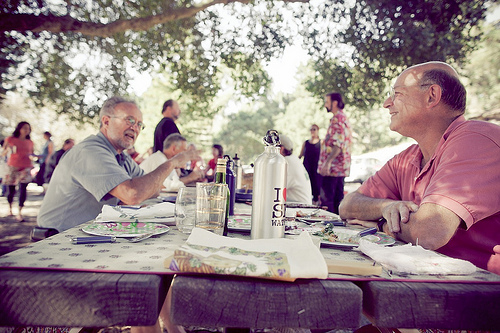 A $5 Challenge potluck in Berkeley.Photo: James Besser
A $5 Challenge potluck in Berkeley.Photo: James Besser
Viertel says he saw a groundswell of people who “wanted to find an organization that would give them a pathway to do something about [their food system]. That something could be working to get a garden planted in your kid’s school, it could be getting connected to a farmer, or it could be getting involved in a legislative fight to end farm subsidies.” While Slow Food has long held “good, clean, and fair” as its motto, Viertel believes that SFUSA’s recent emphasis on fairness has attracted a new following of enthusiastic food novices eager to share recipes, talk about the challenges of food access, and sign online petitions.
How political is too political?
It’s this last part — the fact that the organization has waded, swum, and is now diving deep into advocacy — that most bothers Tooker.
“There’s really been a confusion of the message,” she says. For one, the new SFUSA has been “trying so hard to redefine the identity and get rid of this air of elitism they believed existed.” It also used its blog to talk about food safety (including the giant egg recall linked to Jack DeCoster’s Midwest CAFO dynasty in 2010), led a campaign against the proposed ag-gag bills, and sent out action alerts about last fall’s “Secret Farm Bill.” In other words, the organization has adopted what Tooker calls “a political stance.”
Meanwhile, she says, the current Brooklyn-based SFUSA office “doesn’t even have a kitchen!”
In 1999, while the World Trade Organization’s Seattle meeting faced mass protests, Tooker heard Slow Food founder Carlo Petrini speak at an early stateside gathering. “He said it was not our jobs to march in the streets and protest. Carlo said the work of Slow Food was in the kitchen. And over the long range we would eventually win this fight with a smile in our hearts.”
Cheap for whom?
This mentality, and the organization’s heavy focus on biodiversity and heirloom varieties, might never have changed if it weren’t for Slow Food Nation — a 50,000-person event initiated by Chez Panisse chef and Slow Food matriarch Alice Waters that took place in San Francisco in 2008. Not only did this event position SFUSA as a leader, perhaps the leader, of today’s sustainable food world, it also provided a brief but important opportunity for food justice advocates to make their case to the Slow Foodies.
Some advocates believe that a food-justice panel during Slow Food Nation that Viertel attended helped move the issue onto his agenda. Hank Herrera, an Oakland, Calif.-based food-justice advocate, recalls: “We spoke plainly about the issue of food justice and the exclusion of communities lacking access to healthy food and food justice. Josh took the challenges seriously and from that point has worked vigilantly to bring food justice into focus for Slow Food.”
But to hear Viertel tell it, his interest in food justice began much earlier. Before he began working in the food movement, Viertel farmed vegetables. It was a meager living, and he and his partner (now his fiancee) sold their produce at farmers markets “to people who could pay a lot.”
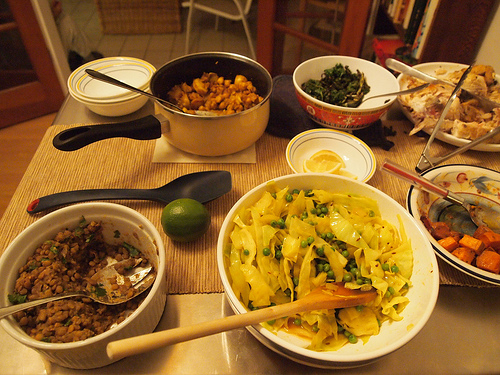
“We didn’t think twice about charging what we did, because we knew the work that went into it,” he recalls. “At the same time people would come to the stand who were shopping with WIC [federal aid for women, infants and children] coupons and we’d charge two for one.” That year, he and his partner earned only $12,000 between the two of them. He says he began to see “this false choice between paying the farmer what they deserve and actually creating a world where both [the eater and the farmer] can afford real food.”
That awareness was likely part of the impetus for SFUSA’s recent $5 Challenge, a direct response to the fast food industry intended to show a meal can be prepared using “Slow Food” or sustainable ingredients bought directly from local farmers for under $5 per person (roughly the cost of a value meal).
Author and native foods expert Gary Paul Nabhan, a critic of Slow Food USA who coauthored the “10 Things” document, takes issue with the $5 Challenge, which, he argues, does a disservice to food producers by discouraging eaters from paying the “true cost of food.” In a recent essay on the Edible Communities website, he suggested that efforts like the $5 Challenge “assum[e] that food justice is only about aiding and empowering low-income consumers.” He asked: “If food production costs have risen 20 to 40 percent for many grains, vegetables, fruits, and meats over the last year, who should shoulder the costs: the producers, or the so-called ‘end-users’ of the food system?”
Slow Food USA board member (and occasional Grist contributor) Kurt Michael Friese counters that $5 per person for ingredients is not very cheap at all.
“You can pay the farmer a fair price and still make really good food and have it be under $5 per portion. That doesn’t rule out heritage breeds in any way. In fact it helps to support them. I think it’s fine for the people who can afford to buy some expensive heritage turkey or some rare pig breed. It’s important valuable stuff. But it’s not the only way people can support Slow Food,” he says.
In response to accusations that efforts like the $5 Challenge don’t support farmers, Viertel is adamant that a just food system include both ends of the food chain: the eater and the producer.
“Talking to a dairy farmer in Vermont and a working parent in Queens isn’t very different. They both have crushing debt. They both get up really early in the morning. They both tend to have a hard time affording real food. And they both are controlled by a really consolidated corporate food system,” he says. From distribution to retail to corporations involved in meatpacking, “there are a lot of companies that wedge themselves in between the producer and the consumer. So the way this debate sets them up against one another is really problematic.”
While Viertel sees Slow Food’s original work as important, he also wants to serve those who can’t — by necessity — support heirloom varieties or shop in farmers markets. “No movement I have ever seen can go forward without the people who are hurt most at its core,” he says.
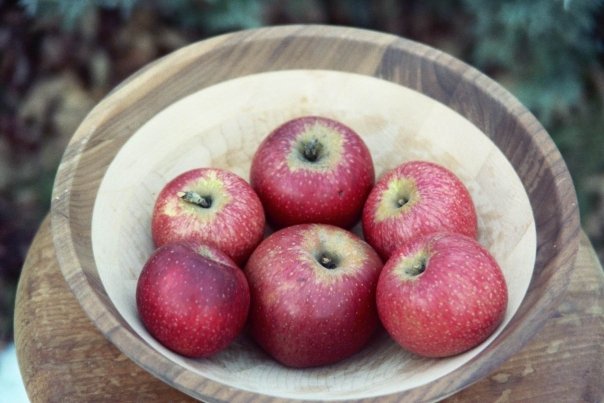
The SFUSA Ark of Taste has provided a way for enthusiastic chapters to catalogue and protect forgotten and neglected heirloom fruit and vegetable varieties (like these Hauer Pippen apples). Photo: Slow Food USA
The biodiversity issue
Tooker has long been involved in the North American chapter of the Slow Food USA’s Ark of Taste, the national portion of an international effort to catalogue, bring attention to, and therefore preserve endangered heirloom and place-based foods. Earlier this year, she says the Ark of Taste committee was “given a stop work order,” and Tooker worries about the future of the effort. One of the SFUSA staffers laid off in November was the last contact for the Ark work, and she says, “If you were to propose a food to be accepted onto the SFUSA Ark, there’s no methodology in place to do that right now.”
But Friese says it is alive and well, despite being put on hold briefly this year for a reorganization. “We’ve turned the whole thing around from being centrally located, with the work being run entirely from the national office, to being something where we support what various chapters are doing with native foods in their specific locations.”
Rather than host a committee that votes on which foods are worth preserving, SFUSA will allow local chapters to put forward food they’re excited about in a more “open-source” manner, and SFUSA will give them a platform to do that work.
The organization has moved in a similar direction with disaster funding. After Katrina, SFUSA set up a disaster fund that was administered by a national committee, but they now plan to support individual chapters that rally around farmers in their area. “The idea is to be able to point our growing network toward their effort and help them fundraise,” says Viertel.
The food-justice generation?
Viertel says he has never intended to do away with the group’s biodiversity work. And given its history, it’s unlikely that SFUSA will ever become a full-fledged food-justice organization, says People’s Grocery Director Nikki Henderson.
But Henderson isn’t surprised that Viertel and the younger generation of SFUSA staffers see food in an inherently political light.
“The last 30 years have wreaked havoc, and I feel like those of us who grew up in that don’t feel as separate from those who are struggling in the streets every day. Our generation is sicker, poorer, and more diverse that any generation in recent history — so of course we’re going to feel that way!”
And while Viertel is clearly uneasy about all the attention this conflict has brought to the organization, Henderson thinks it’s about time the food movement recognize SFUSA for being brave enough to attempt to make space for two efforts that can appear contradictory at times.
“SFUSA has tried to negotiate a minefield,” she says. “And they’re setting off mines. That’s not a bad thing.”
Update: Josh Viertel responds on the Atlantic’s website

